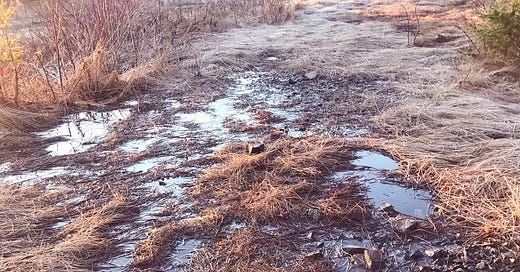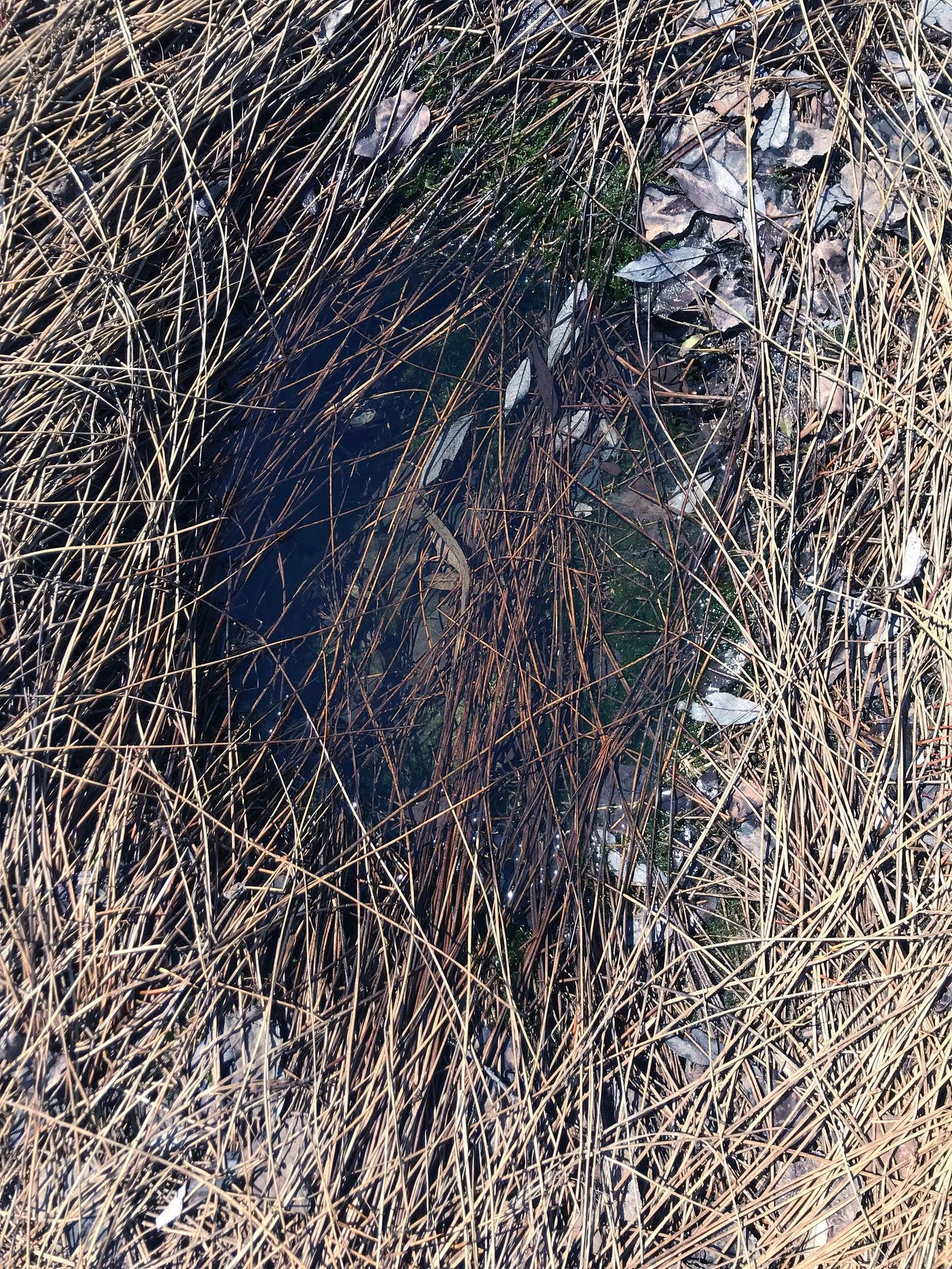The landscape I wander has few of its original natural features - not surprising given the radical transformation by men & machine during the silver boom era of the early 20th century.
Still, there are similarities: trenches in the earth that mimic streams, mounds of rock and dislodged soil that mimic pits and mounds. So even though chances are the vernal ponds this morning are not natural, I’m still drawn to their whimsy.
Vernal, meaning of spring-time. These are temporary pools that form during spring run-off and spring showers: small, often hidden within forests. Sometimes they last a month, or a few months. Isolated, and without a permanent inlet or outlet for other waters, they are fish-free. This means that for critters like frogs and salamanders they are also predator-free – no one to gobble up their precious stashes of eggs. And they also offer a discreet place to rest for turtles and snakes, a refreshing beverage for a passing fox or hare.
Safe, hidden, fleeting. Clearly, to my mind then, they must be fairy pools.
Water bodies as sites of magic – seems a reasonable approach to thinking about something so intertwined with the stuff of life. Where would we humans be without water? Life-giving, but even more. Water bodies are often sources of spiritual sustenance, some are thought to be portals, or peripheral spaces, shores suited to transformation – selkies, kelpies, even that little mermaid – or curative pools, brimming with healing powers. So yes, much magic to be found in and around water.
One of my favourite tales that involves a disappearing water body, but on a much grander scale than my modest vernal puddles, is about the Lake of the Eye / Lough na Súil in county Sligo, Ireland. At the heart of the story is the epic Battle of Moytura, a war between two supernatural peoples, the Tuatha Dé Danann and the Fomorians.
Leading the charge for the Fomorians was Balór na Súile Nimhe (Balor of the Evil Eye), a big brute with some serious cyclops-adjacent features – his third eye was a massive, fiery ocular monstrosity in the middle of his forehead. No man could survive its gaze. His glance smouldered across the battlefield, igniting the bracken and trees and opposing armies.
As Balor laid waste to all around him, his grandson Lugh launched a spear that plunged through Balor’s eye, driving it out through the back of the giant’s head, spinning his grim gaze around onto his own army. As he died, his eye burnt a huge pit into the earth itself. The pit filled with water and became Lough na Súil - The Lake of the Eye.
Legend says the lake disappears every hundred years or so - perhaps when Balor’s third eye gets twitchy. And indeed, the lake has actually vanished, in 1833, 1933, 1965 and even into the 2000s. By all accounts, Balor was a bad fellow, so to me the comings and goings of the lake are a nudge, a reminder that we can’t forget that evil hangs about, just below the surface, only needs a good stirring or an eye twitch to manifest itself.
And then there are other water bodies whose shrinkage or outright disappearance has nothing whatsoever to do with magic but rather the kind of greed and destruction Balor represents:
Lake Poopó, Bolivia: mining-related water consumption, climate change
Poyang Lake, China: water diversion, over-consumption, drought
Aral Sea, Kazakhstan: diversion, over-consumption
Siberian Lakes, Russia, well over 100: permafrost permeability, climate change
Lake Mead, the reservoir for the Hoover Dam: over-consumption, drought, climate change
Alaskan lakes, almost 200: permafrost permeability, climate change
The drying up of vernal pools is natural. The occasional draining of Lake of the Eye, well, perhaps supernatural, maybe unique geology. But for many of our other lakes, streams, rivers, and seas, it is the dread hand of humanity. From us, our waters recoil, recede, retreat. Even refuse to sooth us and our burning planet.
And without water, how can we extinguish the fires from Balor’s eye, stop the dark and demonic forces of greed? So best to see in these charming, ephemeral vernal pools a cautionary warning, to protect our waters at all costs - because sometimes, in the world of magic, now you see it, now you don’t.





We humans are composed of approx. 60% water, we supposedly emerged from the prehistoric ocean beds. WATER. We are nothing without it. Our very survival depends upon our good stewardship of the precious resource we have come to take for granted.